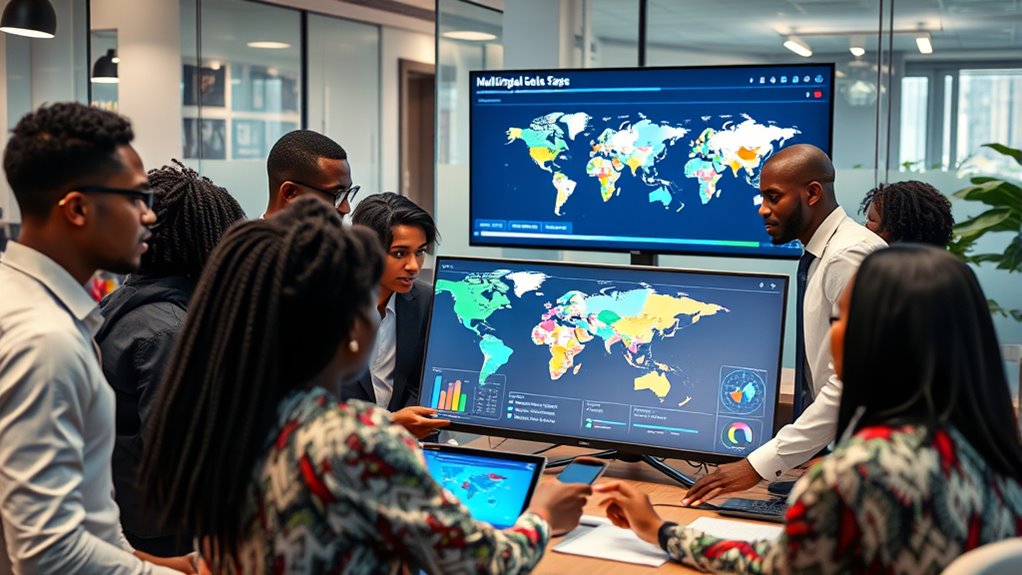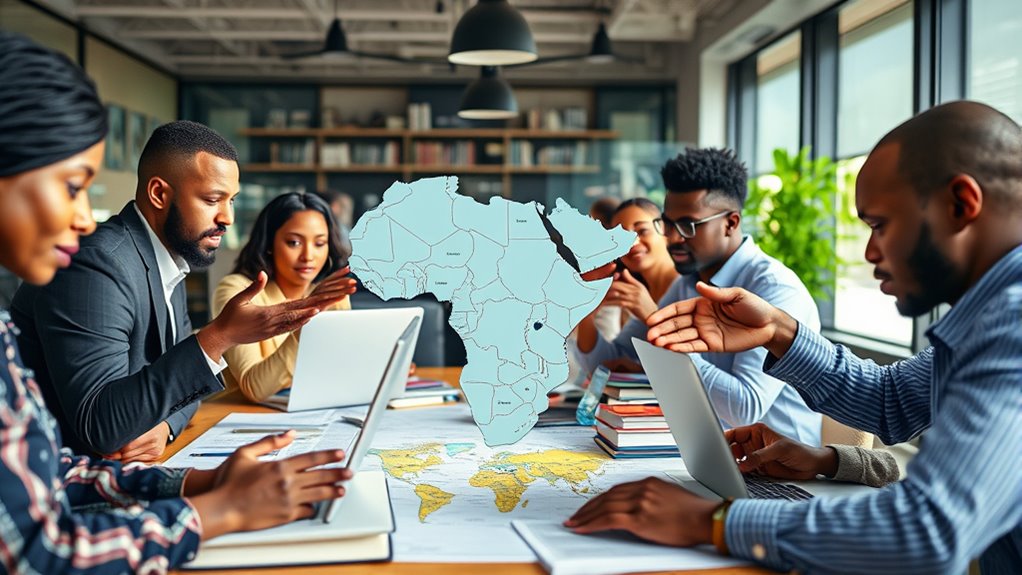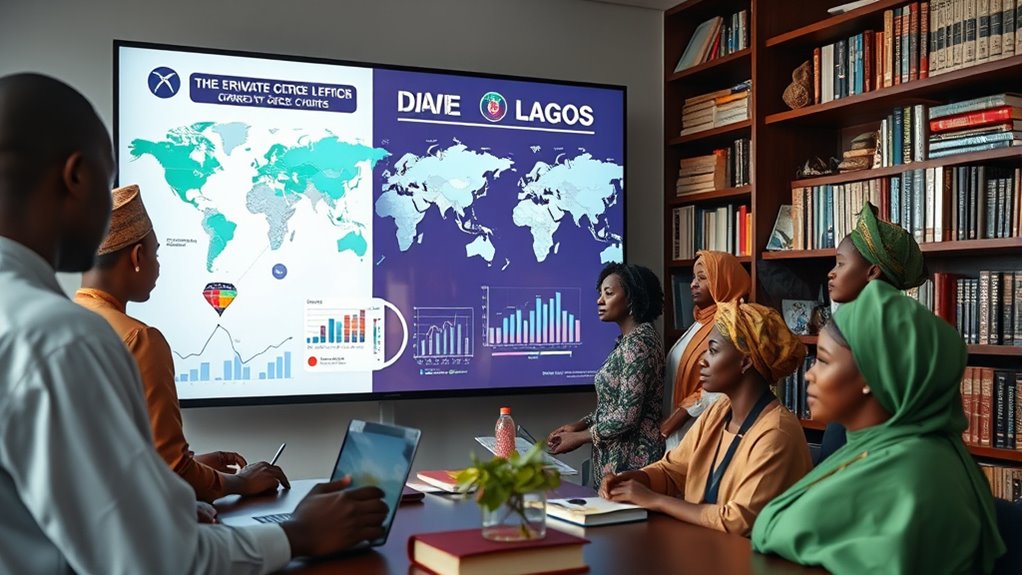In Nigeria’s diverse linguistic landscape, Translation Africa offers specialized multilingual SEO services that optimize content for languages like Hausa, Yoruba, and Igbo, enhancing search engine rankings and global reach for businesses. Their certified translators guarantee cultural sensitivity and accuracy, boosting organic traffic, brand loyalty, and revenue through precise keyword research and tools like SEMrush. This approach addresses local nuances while driving sustainable growth. Additional insights into strategies and best practices await exploration.
Quick Summaries
- Professional translation services in Nigeria optimize multilingual content to improve SEO rankings and global reach.
- Certified translators adapt SEO strategies for local languages like Hausa, Yoruba, and Igbo, ensuring cultural accuracy.
- Essential tools like SEMrush and Ahrefs facilitate keyword research for multilingual SEO in African markets.
- Local language optimization techniques enhance website visibility and user engagement in Nigeria’s diverse linguistic environment.
- Multilingual SEO boosts organic traffic and revenue for African businesses by addressing cultural nuances and search intent.
Benefits of Multilingual SEO in Nigeria

Multilingual SEO offers key advantages in Nigeria, where linguistic diversity spans over 500 languages, enabling businesses to reach broader audiences and enhance online visibility. In this diverse market, optimizing content for multiple languages allows companies to target specific ethnic groups, such as Yoruba or Hausa speakers, improving search engine rankings and user accessibility. This strategy drives higher organic traffic, as localized content aligns with user queries, leading to increased engagement and conversions. Businesses gain a competitive edge by fostering trust and cultural relevance, which strengthens brand loyalty. Moreover, multilingual SEO supports better customer retention through personalized experiences, ultimately boosting revenue in Nigeria’s dynamic digital economy. By embracing linguistic inclusivity, firms can expand their market share and adapt to evolving consumer preferences effectively.
Overview of Translation Africa Services

Translation Africa Services provides specialized translation and localization solutions tailored to Nigeria’s multilingual market, helping businesses adapt content for diverse linguistic needs. As a key player in the industry, they offer extensive services across more than 50 languages, including major Nigerian tongues like Hausa, Yoruba, Igbo, and Pidgin English. Their expert team of certified linguists and cultural specialists guarantees accurate, contextually appropriate translations that preserve original intent. Services encompass document translation, website adaptation, software localization, and multimedia content, catering to sectors such as business, education, healthcare, and legal. Emphasizing precision and cultural sensitivity, Translation Africa utilizes advanced tools for quality assurance and timely delivery, enabling seamless communication in Nigeria’s vibrant linguistic environment. This focus helps organizations effectively navigate the complexities of multilingual content without compromising authenticity or relevance.
Strategies for Effective Multilingual SEO

In Nigeria’s diverse linguistic landscape, optimizing SEO for multiple languages demands a strategic approach that prioritizes cultural relevance and search engine algorithms. Effective strategies begin with thorough keyword research across languages, guaranteeing terms resonate with local audiences while aligning with global search patterns. Businesses should implement hreflang tags to signal language and regional targeting to search engines, preventing content duplication issues. Content creation must adapt to nuances in tone, idioms, and context, fostering user engagement without compromising authenticity. Regular analytics tracking, such as monitoring traffic and bounce rates per language, allows for iterative refinements. Collaboration with native linguists guarantees accuracy, while mobile optimization caters to Nigeria’s tech-savvy users. Ultimately, these tactics enhance visibility, driving organic traffic in a competitive digital space.
Local Language Optimization Techniques
Local Language Optimization Techniques form a critical part of multilingual SEO in Nigeria, beginning with Keyword Research Basics to identify relevant terms in native languages. Content Translation Strategies guarantee that materials are accurately adapted while maintaining cultural nuances and search intent. SEO Adaptation Techniques further refine these efforts by adjusting on-page elements to align with local search engine algorithms.
Keyword Research Basics
Effective keyword research serves as the cornerstone of multilingual SEO, especially in Nigeria where local languages like Yoruba, Igbo, and Hausa play a pivotal role. In this scenario, businesses must identify high-volume, relevant keywords by analyzing search trends in these languages using tools like Google Keyword Planner or specialized SEO software. Researchers focus on cultural nuances, such as colloquialisms and regional dialects, to guarantee keywords align with user intent. For instance, long-tail phrases in Hausa might target specific queries more effectively than generic English terms. Prioritizing local language keywords enhances visibility on platforms like Google Nigeria, driving organic traffic and improving rankings. Additionally, tracking competitor keywords in native tongues helps refine strategies, guaranteeing content resonates with diverse audiences while adhering to SEO best practices. This foundational step maximizes reach in Nigeria’s multilingual market.
Content Translation Strategies
Translating content effectively for multilingual SEO in Nigeria requires precise strategies that adapt to local languages like Yoruba, Igbo, and Hausa. These strategies prioritize cultural nuances to guarantee translations resonate with native audiences, enhancing engagement and authenticity. For instance, employing professional translators fluent in these languages helps avoid literal interpretations that could distort meaning or offend cultural sensitivities. Techniques such as transcreation—blending translation with creative adaptation—maintain the original content’s intent while tailoring it to local contexts. Additionally, using bilingual SEO tools allows for keyword optimization in native scripts, improving search visibility on platforms like Google Nigeria. Regular quality checks, including back-translation, verify accuracy and SEO alignment without altering core messages. This approach boosts user trust and drives organic traffic in diverse linguistic markets. Ultimately, effective content translation bridges language barriers, fostering inclusivity in Nigeria’s multilingual digital landscape.
SEO Adaptation Techniques
Adapting SEO for Nigeria’s diverse languages involves targeted techniques that optimize content for search engines in Yoruba, Igbo, and Hausa. These methods focus on keyword localization, ensuring terms resonate culturally while maintaining search relevance. For instance, experts conduct in-depth keyword research using tools adapted for African languages, integrate regional idioms into content, and optimize meta elements to align with local search behaviors. This enhances user engagement and drives traffic.
| Technique | Description | Benefits |
|---|---|---|
| Keyword Localization | Adapt keywords to dialects and idioms | Boosts search visibility |
| Content Culturalization | Incorporate local customs and phrases | Increases user engagement |
| Meta Tag Optimization | Translate and refine titles/descriptions | Improves click-through rates |
| Backlink Building | Secure links from regional sites | Enhances domain authority |
| Performance Analytics | Monitor metrics in native languages | Enables precise strategy tweaks |
Impact of SEO on African Businesses
In the digital era, SEO has profoundly shaped African businesses by boosting online visibility and enabling them to compete globally. Through strategic keyword optimization and content enhancement, companies achieve higher search engine rankings, driving organic traffic and customer engagement. In Nigeria, for instance, small and medium enterprises have reported significant revenue growth from improved online presence, allowing them to penetrate international markets. SEO also fosters adaptability in a dynamic digital landscape, helping businesses track performance metrics for informed decisions. This results in cost-effective marketing, reduced reliance on traditional advertising, and stronger brand loyalty. Ultimately, SEO empowers African firms to innovate, expand operations, and contribute to economic resilience, bridging the gap between local enterprises and global opportunities while promoting sustainable development across the continent.
Key Features of Professional Translation Services
Professional translation services are defined by essential features that guarantee precise and culturally sensitive communication across languages. These elements guarantee that content resonates with diverse audiences while maintaining original intent. In the context of multilingual SEO, such services bridge linguistic gaps, enhancing global reach for businesses in Nigeria and beyond. They emphasize accuracy to avoid misinterpretations that could harm brand reputation.
- Expertise in Linguistics: Services employ certified translators with native fluency, guaranteeing idiomatic accuracy and contextually appropriate phrasing.
- Cultural Adaptation: Professionals integrate local customs and nuances, making translations culturally relevant and engaging for target demographics.
- Quality Assurance Processes: Rigorous editing and proofreading protocols verify fidelity, reducing errors and upholding professional standards.
Tools and Resources for Multilingual SEO
Effective tools and resources play a vital role in multilingual SEO within Nigeria’s digital landscape. Essential SEO tools, such as keyword research platforms and analytics software, help optimize content for diverse languages. Multilingual resource options, including translation APIs and cultural databases, further enhance accessibility and relevance for global audiences.
Essential SEO Tools
Essential SEO tools are vital for managing multilingual content optimization, particularly in Nigeria’s diverse linguistic landscape. These tools streamline keyword research, site audits, and performance tracking across languages, ensuring content resonates with local audiences while adhering to search engine algorithms. By leveraging such resources, businesses can enhance visibility and competitiveness in global markets without compromising on cultural nuances.
- Google Search Console: Monitors site performance for various language versions, identifying issues like indexing errors and providing insights into user queries in different regions.
- SEMrush: Facilitates multilingual keyword analysis, helping identify high-volume search terms and competitor strategies tailored to Nigerian languages.
- Ahrefs: Analyzes backlinks and domain authority for multilingual sites, enabling targeted link-building efforts to boost rankings in diverse linguistic contexts.
Multilingual Resource Options
Multilingual resource options for SEO encompass a range of tools and platforms designed to optimize content across diverse languages, particularly in Nigeria’s multicultural environment. These include translation software like Google Translate API and DeepL, which guarantee accurate localization, and keyword research tools such as SEMrush and Ahrefs that support multiple languages for targeted searches. In Nigeria, where English, Hausa, Yoruba, and Igbo dominate, platforms like Moz and Sistrix provide analytics to track performance in various linguistic markets. Additionally, content management systems such as WordPress with multilingual plugins enable seamless adaptation of websites. Businesses leverage these resources to enhance visibility, improve user engagement, and comply with local SEO best practices, ultimately boosting global reach and competitiveness in Africa’s dynamic digital landscape. This strategic use of tools fosters inclusive online presence, driving sustainable growth.
Case Studies in Nigerian SEO Success
Several case studies in Nigeria highlight how targeted SEO strategies have driven measurable business growth, demonstrating the real-world application of techniques tailored to local markets and multilingual audiences. These examples underscore the effectiveness of SEO in diverse contexts, such as e-commerce and service sectors, where businesses achieved significant online visibility and revenue increases.
- A Lagos-based e-retailer saw a 150% traffic surge after optimizing for Hausa and Yoruba keywords, reaching underserved demographics and boosting sales by 80%.
- An Abuja tech firm implemented geo-targeted SEO, resulting in a 200% rise in organic leads through localized content, enhancing market penetration.
- A Nigerian tourism company utilized multilingual backlinks, leading to a 120% increase in international bookings by improving search rankings across platforms.
Challenges in Implementing Multilingual SEO
Implementing multilingual SEO in Nigeria presents notable challenges that affect its effectiveness. Language barriers impact content creation and user interaction, hindering best search rankings. Algorithm regional differences and cultural SEO obstacles further complicate strategies, requiring tailored approaches for diverse audiences.
Language Barriers Impact
How do language barriers challenge multilingual SEO efforts in Nigeria? Language barriers hinder effective content optimization and audience engagement by complicating accurate translations and cultural adaptations in a linguistically diverse nation. This results in suboptimal keyword targeting and reduced visibility on search engines, ultimately affecting business reach and conversion rates.
- Translation inaccuracies: Misinterpreted words or phrases can distort content meaning, leading to lower search rankings and user distrust.
- Cultural nuances: Local idioms and contexts often fail to translate directly, diminishing content relevance and engagement in specific regions.
- Keyword research complexity: Identifying effective multilingual keywords becomes arduous, as linguistic variations obscure popular search terms and intent.
Algorithm Regional Differences
Algorithm regional differences present a formidable challenge for multilingual SEO in Nigeria, where search engines tailor algorithms to local preferences, potentially undermining global strategies and reducing content visibility. For instance, Google’s algorithms may prioritize region-specific factors like user location and search history, making it difficult for businesses to optimize content across languages such as English, Hausa, Yoruba, and Igbo. This requires SEO experts to analyze localized ranking signals, such as mobile usage patterns prevalent in Nigeria, to achieve effective keyword targeting and site indexing. Consequently, failing to adapt can lead to lower search rankings, diminished organic traffic, and missed opportunities in diverse markets. Businesses must conduct thorough algorithm audits and use tools like Google Search Console to align multilingual content with these regional nuances, enhancing overall digital presence without overgeneralizing tactics. This approach demands precision to navigate the complexities of Africa’s dynamic online landscape.
Cultural SEO Obstacles
Cultural nuances in Nigeria often complicate multilingual SEO efforts, as varying linguistic traditions and social customs can undermine content relevance and user engagement across languages like English, Hausa, and Yoruba. These challenges arise from the need to adapt content that resonates culturally while optimizing for search algorithms, potentially leading to lower rankings if translations overlook local contexts.
- Idiomatic Expressions: Direct translations of idioms may lose meaning, causing keyword mismatches and reduced search visibility in regional dialects.
- Cultural Sensitivities: Taboos or social norms vary by ethnic group, risking audience alienation if content inadvertently offends, therefore lowering engagement metrics.
- User Behavior Variations: Diverse preferences in query phrasing across languages demand tailored strategies, complicating unified SEO campaigns and affecting traffic flow.
Cultural Adaptation in SEO Practices
In the context of multilingual SEO services in Nigeria, adapting practices to local cultural nuances enhances content relevance and user engagement. This involves tailoring keywords, imagery, and messaging to align with regional customs, languages, and values, fostering deeper connections with diverse audiences. For instance, incorporating Yoruba proverbs or Igbo festivals into content can resonate emotionally, boosting trust and shares. Effective adaptation also means avoiding cultural missteps, like insensitive translations, to prevent alienation.
Cultural adaptation transforms SEO from mere optimization to meaningful interaction.
| Cultural Oversight Example | Emotionally Adapted Approach |
|---|---|
| Ignoring local idioms in copy | Integrating idioms to evoke nostalgia |
| Generic visuals | Using culturally specific imagery |
| One-size-fits-all keywords | Tailoring keywords to emotional themes |
| Overlooking festivals | Highlighting celebrations for joy |
| Standard engagement tactics | Customizing for community pride |
Measuring ROI for SEO and Translation Efforts
Measuring ROI for SEO and Translation Efforts involves tracking key SEO metrics such as organic traffic and keyword rankings to evaluate performance. Businesses must calculate translation ROI by evaluating the cost of localization against increased market reach and conversions. Analyzing effort returns then helps determine the overall effectiveness of these investments in enhancing multilingual SEO strategies.
Track SEO Metrics
Tracking SEO metrics is essential for evaluating the return on investment in multilingual SEO efforts, particularly in Nigeria’s diverse market. This process allows businesses to gauge the performance of SEO strategies across languages, ensuring resources are allocated effectively for sustained online visibility. By analyzing data, companies can refine campaigns to better engage multicultural audiences, ultimately driving growth in competitive sectors.
- Monitor Organic Traffic: Track increases in site visits from search engines to assess reach in different languages, providing insights into audience engagement.
- Evaluate Keyword Performance: Regularly check rankings for multilingual keywords to identify effective terms and optimize content for better search results.
- Assess User Behavior Metrics: Analyze bounce rates and session durations to understand how well content resonates, informing adjustments for improved ROI on SEO initiatives.
Calculate Translation ROI
Calculating ROI for translation and SEO efforts allows businesses to quantify the value of multilingual investments. This involves evaluating the financial returns against costs incurred in content translation and optimization for diverse languages. Businesses typically use formulas like ROI = (Net Profit from Multilingual Traffic – Investment Costs) / Investment Costs, multiplied by 100 for a percentage. Key metrics include traffic growth from translated pages, conversion rates in target markets, and increased revenue from international audiences. By tracking these, companies can evaluate if translation investments, such as SEO keyword localization, yield profitable outcomes. For instance, in Nigeria’s competitive market, accurate ROI calculations help firms prioritize high-impact languages, ensuring resources are allocated efficiently without wasteful expenditure. This strategic approach enhances decision-making for sustainable growth in global SEO.
Analyze Effort Returns
Analyzing returns on SEO and translation efforts requires businesses to go beyond basic calculations, focusing on actionable insights from performance data. This involves using advanced analytics to evaluate long-term impacts, such as increased organic traffic and conversion rates, while accounting for market-specific factors in Nigeria’s multilingual landscape. By integrating tools like Google Analytics and ROI calculators, companies can refine strategies for sustained growth.
To deepen this analysis, consider the following:
- Track key metrics: Monitor organic search rankings, user engagement, and conversion rates to quantify SEO and translation contributions accurately.
- Assess cost efficiency: Compare investment costs against revenue generated, factoring in localization expenses to determine true profitability.
- Iterate based on insights: Use data trends to optimize content and keywords, ensuring efforts align with audience preferences for better ROI over time.
Best Practices for Website Localization
Website localization is essential for businesses targeting diverse audiences, especially in multilingual regions like Nigeria. It involves adapting content to cultural nuances, ensuring accurate translations, and optimizing user interfaces for seamless experiences. Key practices include conducting thorough cultural research, using native speakers for translations, and testing localized versions for functionality. This approach boosts user engagement and retention.
Businesses should prioritize these elements:
| Best Practice | Key Benefits |
|---|---|
| Cultural Adaptation | Enhances relevance and trust |
| Accurate Translation | Reduces misunderstandings |
| Responsive Design | Improves accessibility |
Integrating SEO With Language Translation
Integrating SEO with language translation requires businesses to adapt content for search engine optimization while ensuring accurate multilingual conversions, thereby enhancing global visibility and user engagement in diverse markets like Nigeria. This process demands strategic alignment to balance search algorithms and linguistic accuracy. Businesses must prioritize localized approaches to avoid common pitfalls.
- Conduct targeted keyword research: Identify culturally relevant keywords in each language to optimize for regional search engines, improving ranking potential.
- Maintain SEO elements in translations: Adapt meta descriptions, titles, and alt text during the translation process to preserve technical SEO integrity without altering meaning.
- Implement ongoing performance tracking: Use analytics tools to monitor traffic and conversions across languages, allowing for iterative refinements to content strategy.
Emerging Trends in African SEO Services
As the digital landscape in Africa evolves, SEO services are adapting to new technologies and consumer behaviors, with key trends including mobile optimization, AI-driven analytics, and localized content strategies to enhance visibility across diverse markets. Mobile optimization is surging due to Africa’s high smartphone penetration, enabling faster site loading and better user experiences on limited-data networks. AI-driven analytics are revolutionizing SEO by predicting search trends and personalizing content, helping businesses target niche audiences effectively. Localized content strategies emphasize culturally relevant materials in multiple languages, boosting engagement in multilingual regions like Nigeria and South Africa. These trends foster inclusive digital growth, allowing African businesses to compete globally while addressing unique regional challenges, such as varying internet speeds and linguistic diversity.
Selecting the Right SEO Provider in Nigeria
Choosing the right SEO provider in Nigeria demands a strategic evaluation of expertise, track record, and alignment with local market needs to maximize online visibility and business growth. In Nigeria’s dynamic digital environment, businesses must assess providers capable of handling multilingual challenges and emerging SEO algorithms for sustained competitiveness.
- Evaluate expertise: Scrutinize the provider’s technical skills in keyword research, on-page optimization, and language-specific strategies tailored to Nigeria’s diverse dialects.
- Assess track record: Review verifiable case studies, client feedback, and performance metrics to guarantee proven success in boosting rankings and traffic in African markets.
- Guarantee market alignment: Confirm the provider adapts strategies to local factors like mobile dominance, cultural nuances, and regulatory compliance for effective results.
Frequently Asked Questions
What Is the Cost of Your SEO Services?
The question regarding the cost of SEO services is commonly raised in digital marketing. Prices typically vary based on factors like project scope, keyword competitiveness, and service duration. Providers often offer customized quotes after evaluating specific requirements, ensuring tailored solutions.
How Can I Contact Your Support Team?
The query seeks information on contacting the support team. Individuals can reach out by emailing [email protected], calling the hotline at 1-800-123-4567, or visiting the official website for live chat options.
Do You Offer Free Consultations?
In response to the inquiry about free consultations, the organization offers them to prospective clients. This service allows individuals to discuss needs and options without cost, enhancing accessibility and building rapport in a professional manner.
What Payment Methods Do You Accept?
The current question inquires about the accepted payment methods. The company offers options including major credit cards like Visa and Mastercard, bank transfers, PayPal, and Stripe. Wire transfers and mobile money services are also supported for convenience and security.
How Do You Ensure Data Security?
The organization employs advanced encryption protocols and complies with international data security standards to protect information. Regular audits, employee training, and strict access controls prevent breaches, ensuring data integrity and confidentiality for all clients.



